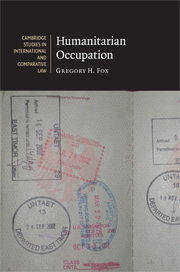Book contents
5 - Constructing the liberal state
Published online by Cambridge University Press: 02 February 2010
Summary
The previous chapter set out the first part of the claim that international law has developed a substantive conception of the state. It argued that in reacting against various extreme practices used to dismantle heterogeneous states, the international community has made a commitment, enshrined in law, to preserving existing borders and populations. That chapter described a largely negative phenomenon – the type of state international law has come to view as unacceptable. This chapter describes the second part of the claim, which is largely positive – a vision of the heterogeneous state in which antagonistic groups are expected to remain and co-exist. The model is both participatory and pluralist: it offers democratic politics as the means by which the groups may secure their political goals, but also sets limits on that politics when it threatens to infringe group and individual rights.
Of course, this model is the familiar one of classical liberalism. But the totality of its vision is not often acknowledged in the literature, which tends to view the liberal policies promoted by international institutions in isolation from each other and not as a coherent vision of national politics. Nor have most authors acknowledged an important systemic consequence of the liberal model: in promoting a state designed to accommodate the concerns of conflicting groups, international law has reaffirmed the state's centrality to the international legal order. Despite sea changes, it is still the essential forum for the practice of politics – political expression, political activism and the exercise of political authority. This view, of course, runs counter to much recent literature predicting the state's slow eclipse by forces of globalization and a host of new transnational actors.
- Type
- Chapter
- Information
- Humanitarian Occupation , pp. 142 - 174Publisher: Cambridge University PressPrint publication year: 2008



